Corporate Law 20059: Case Study on Legal Responsibilities
VerifiedAdded on 2022/08/27
|9
|2227
|33
Case Study
AI Summary
This case study examines a scenario involving SRT Pty Ltd, where shareholders and directors, Mrs. Rosa and Mr. Sam, are also beneficiaries of the Tipping Trust. The case revolves around potential breaches of legal duties under the Corporation Act 2001. The analysis focuses on the actions of Charlotte, who, without Mia's consent, adds a surcharge to a bill. The study investigates whether Mrs. Rosa and Mr. Sam fulfilled their directorial responsibilities with due diligence and good faith, considering sections 180, 181, 182, and 183 of the Act. It explores the implications of their actions, including the misuse of their positions for personal gain and potential liabilities for breaches of duty. The case references relevant legal precedents, including ASIC v Australian Investors Forum Pty Ltd and Bell Group Ltd v Westpac (No 9), and discusses the application of civil penalty provisions, particularly section 1317E and 598 of the Corporation Act 2001. The conclusion determines whether the legal parties have fulfilled their legal duties, performed a breach of duty, and can be held liable, potentially facing penalties, and disqualification.
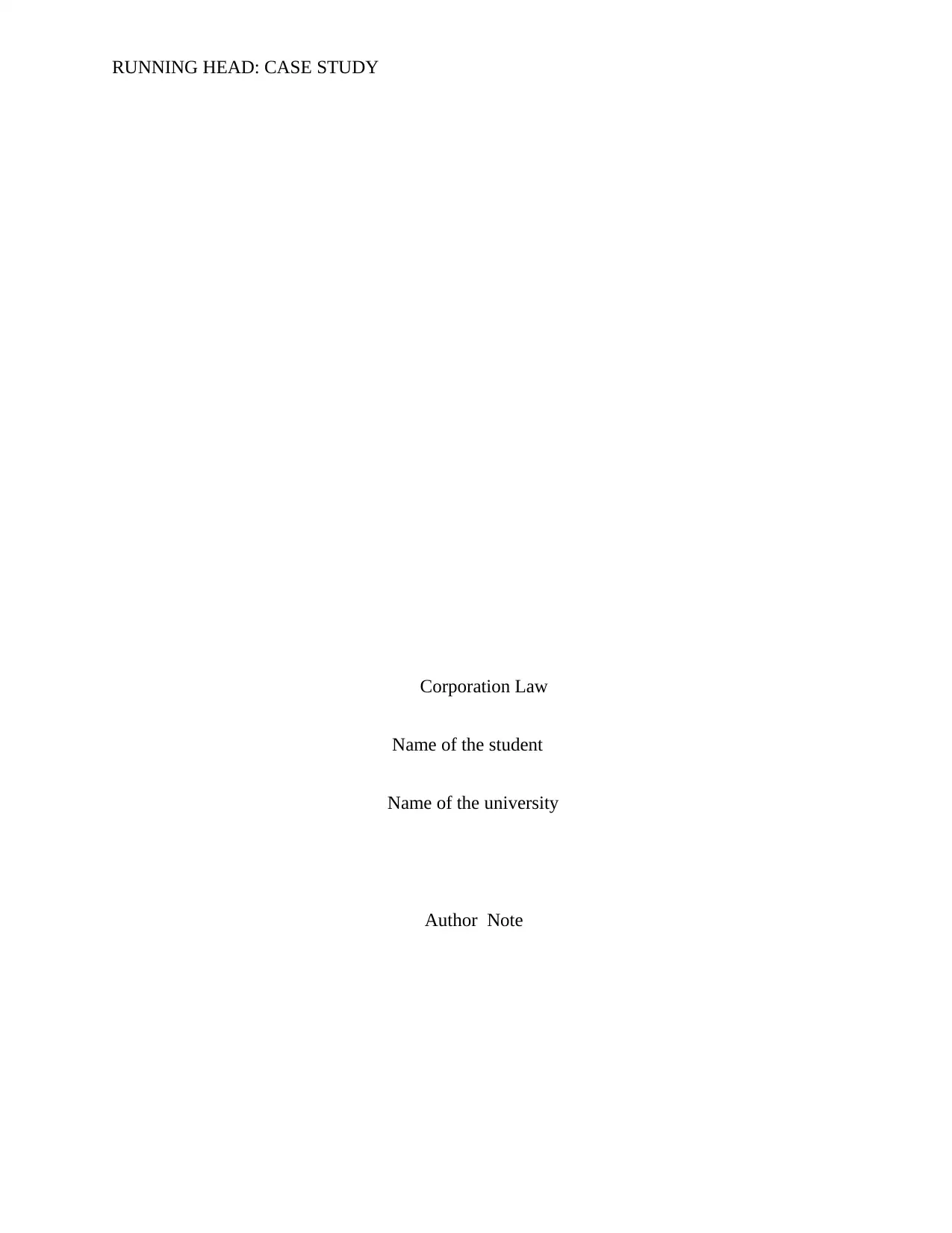
RUNNING HEAD: CASE STUDY
Corporation Law
Name of the student
Name of the university
Author Note
Corporation Law
Name of the student
Name of the university
Author Note
Paraphrase This Document
Need a fresh take? Get an instant paraphrase of this document with our AI Paraphraser
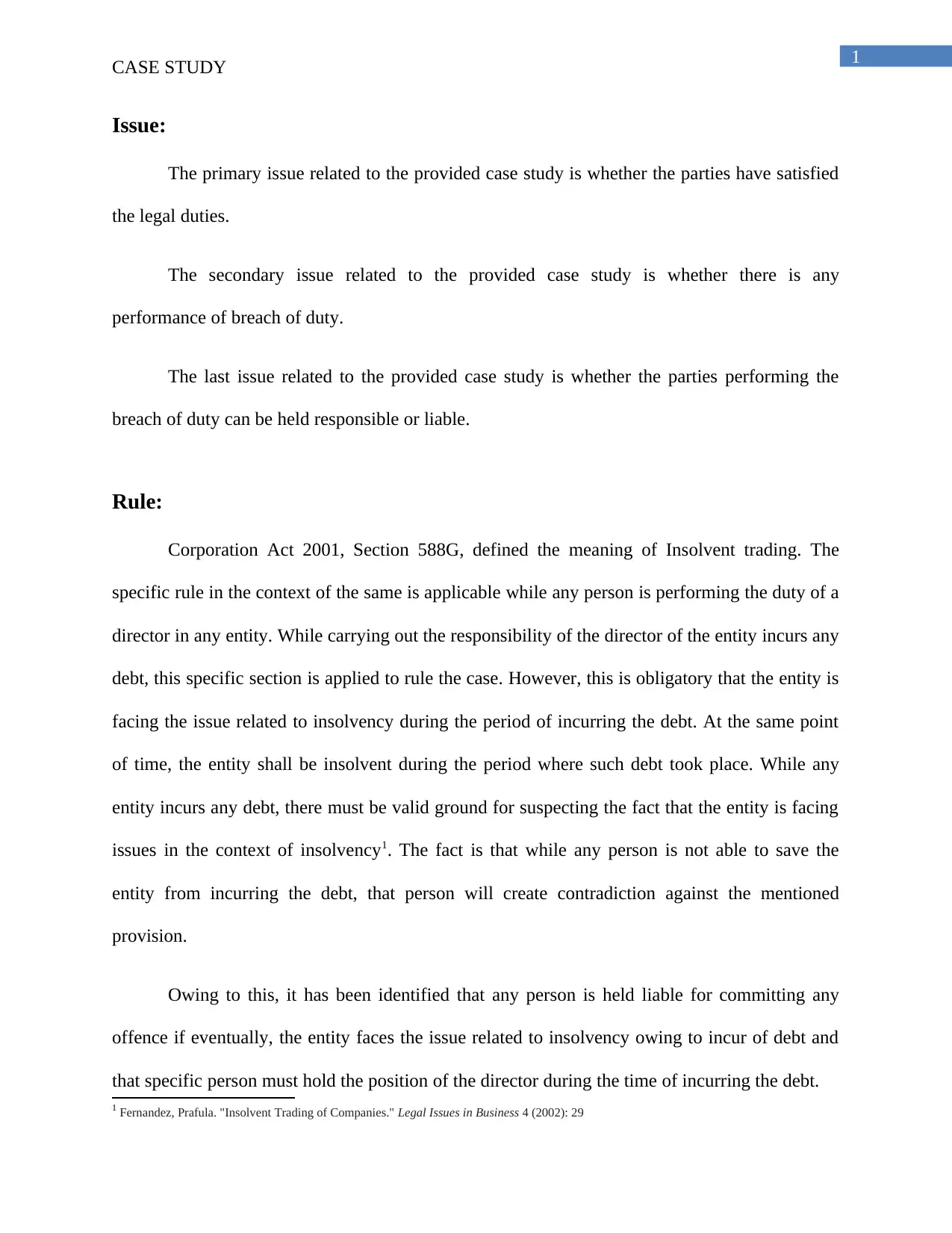
1
CASE STUDY
Issue:
The primary issue related to the provided case study is whether the parties have satisfied
the legal duties.
The secondary issue related to the provided case study is whether there is any
performance of breach of duty.
The last issue related to the provided case study is whether the parties performing the
breach of duty can be held responsible or liable.
Rule:
Corporation Act 2001, Section 588G, defined the meaning of Insolvent trading. The
specific rule in the context of the same is applicable while any person is performing the duty of a
director in any entity. While carrying out the responsibility of the director of the entity incurs any
debt, this specific section is applied to rule the case. However, this is obligatory that the entity is
facing the issue related to insolvency during the period of incurring the debt. At the same point
of time, the entity shall be insolvent during the period where such debt took place. While any
entity incurs any debt, there must be valid ground for suspecting the fact that the entity is facing
issues in the context of insolvency1. The fact is that while any person is not able to save the
entity from incurring the debt, that person will create contradiction against the mentioned
provision.
Owing to this, it has been identified that any person is held liable for committing any
offence if eventually, the entity faces the issue related to insolvency owing to incur of debt and
that specific person must hold the position of the director during the time of incurring the debt.
1 Fernandez, Prafula. "Insolvent Trading of Companies." Legal Issues in Business 4 (2002): 29
CASE STUDY
Issue:
The primary issue related to the provided case study is whether the parties have satisfied
the legal duties.
The secondary issue related to the provided case study is whether there is any
performance of breach of duty.
The last issue related to the provided case study is whether the parties performing the
breach of duty can be held responsible or liable.
Rule:
Corporation Act 2001, Section 588G, defined the meaning of Insolvent trading. The
specific rule in the context of the same is applicable while any person is performing the duty of a
director in any entity. While carrying out the responsibility of the director of the entity incurs any
debt, this specific section is applied to rule the case. However, this is obligatory that the entity is
facing the issue related to insolvency during the period of incurring the debt. At the same point
of time, the entity shall be insolvent during the period where such debt took place. While any
entity incurs any debt, there must be valid ground for suspecting the fact that the entity is facing
issues in the context of insolvency1. The fact is that while any person is not able to save the
entity from incurring the debt, that person will create contradiction against the mentioned
provision.
Owing to this, it has been identified that any person is held liable for committing any
offence if eventually, the entity faces the issue related to insolvency owing to incur of debt and
that specific person must hold the position of the director during the time of incurring the debt.
1 Fernandez, Prafula. "Insolvent Trading of Companies." Legal Issues in Business 4 (2002): 29
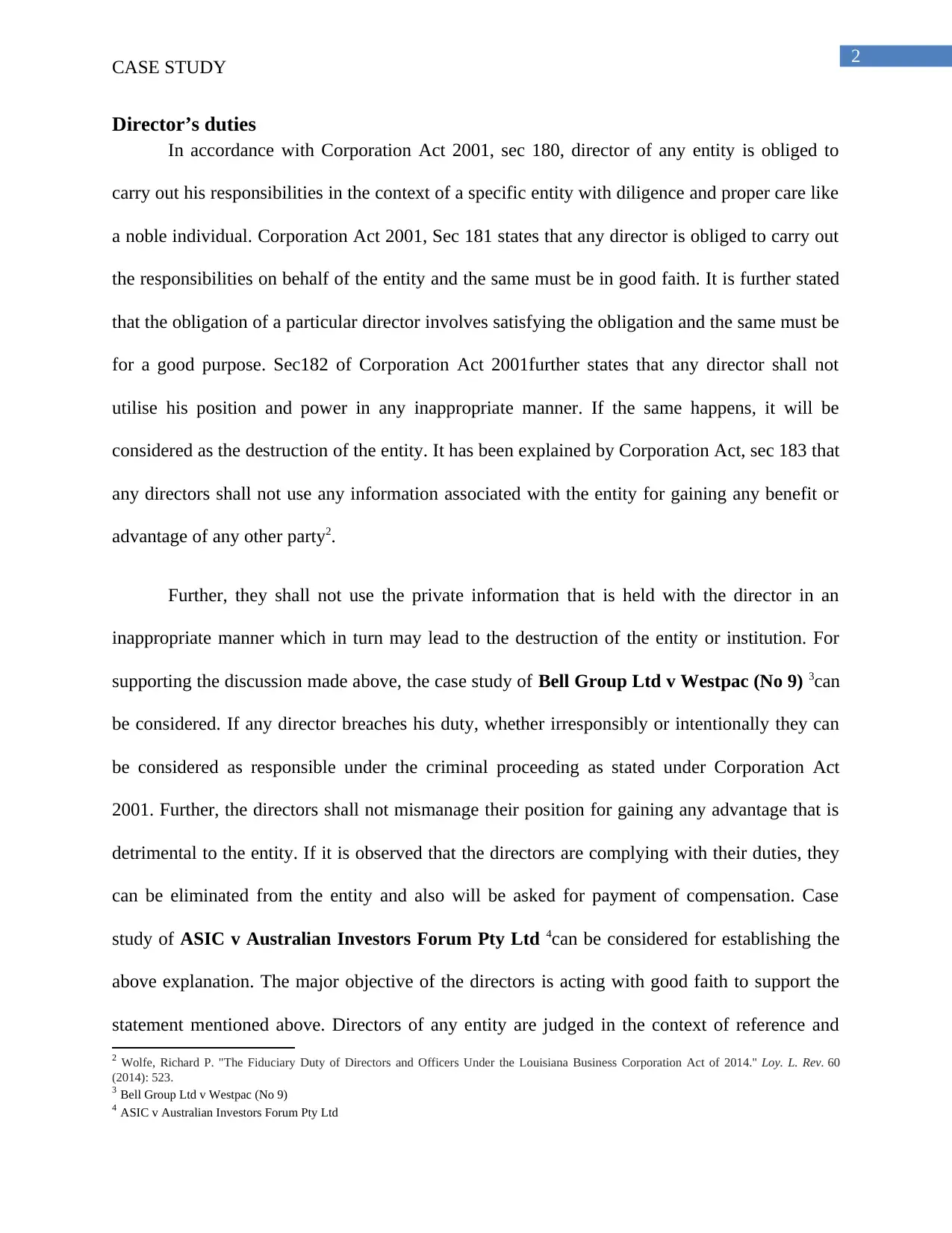
2
CASE STUDY
Director’s duties
In accordance with Corporation Act 2001, sec 180, director of any entity is obliged to
carry out his responsibilities in the context of a specific entity with diligence and proper care like
a noble individual. Corporation Act 2001, Sec 181 states that any director is obliged to carry out
the responsibilities on behalf of the entity and the same must be in good faith. It is further stated
that the obligation of a particular director involves satisfying the obligation and the same must be
for a good purpose. Sec182 of Corporation Act 2001further states that any director shall not
utilise his position and power in any inappropriate manner. If the same happens, it will be
considered as the destruction of the entity. It has been explained by Corporation Act, sec 183 that
any directors shall not use any information associated with the entity for gaining any benefit or
advantage of any other party2.
Further, they shall not use the private information that is held with the director in an
inappropriate manner which in turn may lead to the destruction of the entity or institution. For
supporting the discussion made above, the case study of Bell Group Ltd v Westpac (No 9) 3can
be considered. If any director breaches his duty, whether irresponsibly or intentionally they can
be considered as responsible under the criminal proceeding as stated under Corporation Act
2001. Further, the directors shall not mismanage their position for gaining any advantage that is
detrimental to the entity. If it is observed that the directors are complying with their duties, they
can be eliminated from the entity and also will be asked for payment of compensation. Case
study of ASIC v Australian Investors Forum Pty Ltd 4can be considered for establishing the
above explanation. The major objective of the directors is acting with good faith to support the
statement mentioned above. Directors of any entity are judged in the context of reference and
2 Wolfe, Richard P. "The Fiduciary Duty of Directors and Officers Under the Louisiana Business Corporation Act of 2014." Loy. L. Rev. 60
(2014): 523.
3 Bell Group Ltd v Westpac (No 9)
4 ASIC v Australian Investors Forum Pty Ltd
CASE STUDY
Director’s duties
In accordance with Corporation Act 2001, sec 180, director of any entity is obliged to
carry out his responsibilities in the context of a specific entity with diligence and proper care like
a noble individual. Corporation Act 2001, Sec 181 states that any director is obliged to carry out
the responsibilities on behalf of the entity and the same must be in good faith. It is further stated
that the obligation of a particular director involves satisfying the obligation and the same must be
for a good purpose. Sec182 of Corporation Act 2001further states that any director shall not
utilise his position and power in any inappropriate manner. If the same happens, it will be
considered as the destruction of the entity. It has been explained by Corporation Act, sec 183 that
any directors shall not use any information associated with the entity for gaining any benefit or
advantage of any other party2.
Further, they shall not use the private information that is held with the director in an
inappropriate manner which in turn may lead to the destruction of the entity or institution. For
supporting the discussion made above, the case study of Bell Group Ltd v Westpac (No 9) 3can
be considered. If any director breaches his duty, whether irresponsibly or intentionally they can
be considered as responsible under the criminal proceeding as stated under Corporation Act
2001. Further, the directors shall not mismanage their position for gaining any advantage that is
detrimental to the entity. If it is observed that the directors are complying with their duties, they
can be eliminated from the entity and also will be asked for payment of compensation. Case
study of ASIC v Australian Investors Forum Pty Ltd 4can be considered for establishing the
above explanation. The major objective of the directors is acting with good faith to support the
statement mentioned above. Directors of any entity are judged in the context of reference and
2 Wolfe, Richard P. "The Fiduciary Duty of Directors and Officers Under the Louisiana Business Corporation Act of 2014." Loy. L. Rev. 60
(2014): 523.
3 Bell Group Ltd v Westpac (No 9)
4 ASIC v Australian Investors Forum Pty Ltd
⊘ This is a preview!⊘
Do you want full access?
Subscribe today to unlock all pages.

Trusted by 1+ million students worldwide
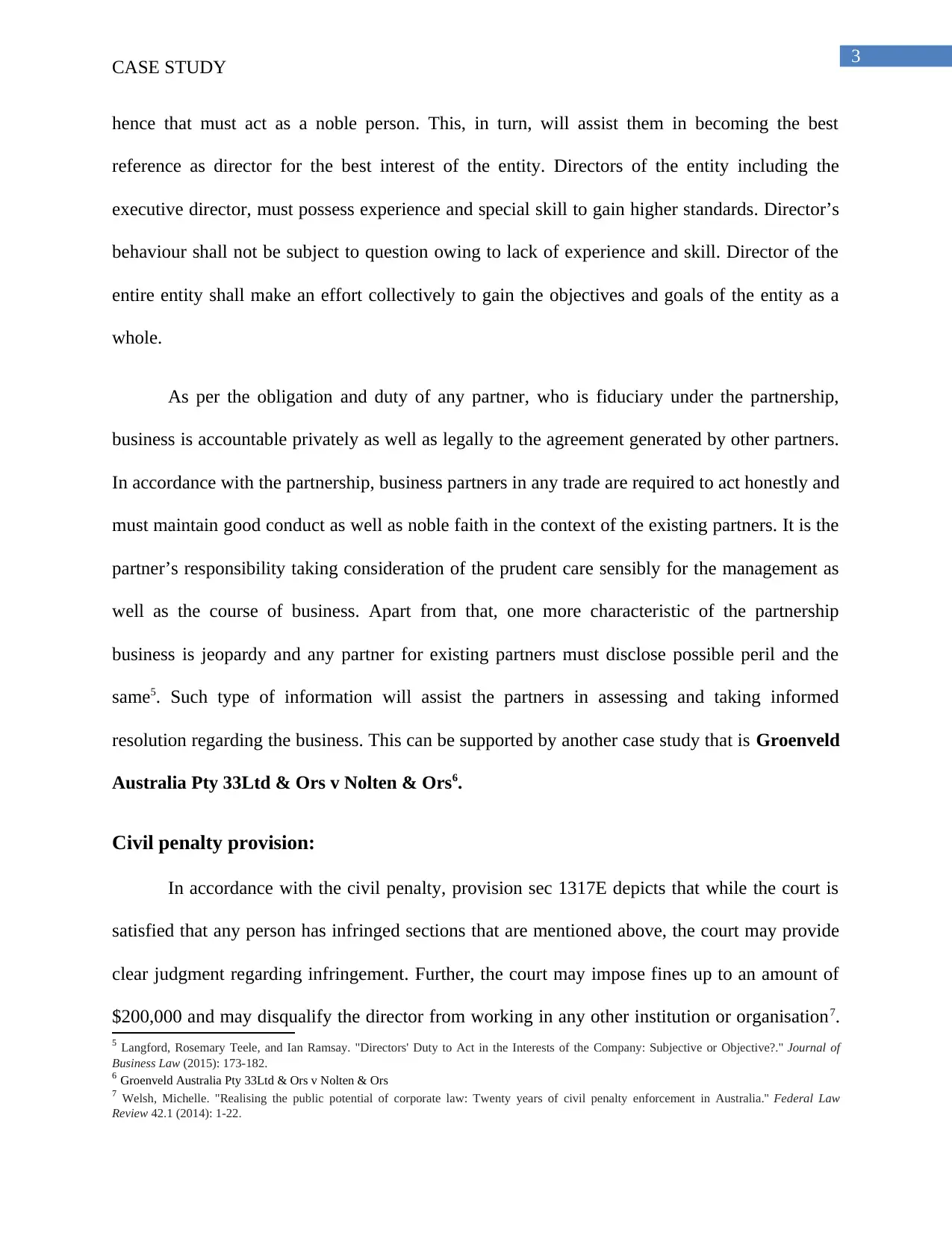
3
CASE STUDY
hence that must act as a noble person. This, in turn, will assist them in becoming the best
reference as director for the best interest of the entity. Directors of the entity including the
executive director, must possess experience and special skill to gain higher standards. Director’s
behaviour shall not be subject to question owing to lack of experience and skill. Director of the
entire entity shall make an effort collectively to gain the objectives and goals of the entity as a
whole.
As per the obligation and duty of any partner, who is fiduciary under the partnership,
business is accountable privately as well as legally to the agreement generated by other partners.
In accordance with the partnership, business partners in any trade are required to act honestly and
must maintain good conduct as well as noble faith in the context of the existing partners. It is the
partner’s responsibility taking consideration of the prudent care sensibly for the management as
well as the course of business. Apart from that, one more characteristic of the partnership
business is jeopardy and any partner for existing partners must disclose possible peril and the
same5. Such type of information will assist the partners in assessing and taking informed
resolution regarding the business. This can be supported by another case study that is Groenveld
Australia Pty 33Ltd & Ors v Nolten & Ors6.
Civil penalty provision:
In accordance with the civil penalty, provision sec 1317E depicts that while the court is
satisfied that any person has infringed sections that are mentioned above, the court may provide
clear judgment regarding infringement. Further, the court may impose fines up to an amount of
$200,000 and may disqualify the director from working in any other institution or organisation7.
5 Langford, Rosemary Teele, and Ian Ramsay. "Directors' Duty to Act in the Interests of the Company: Subjective or Objective?." Journal of
Business Law (2015): 173-182.
6 Groenveld Australia Pty 33Ltd & Ors v Nolten & Ors
7 Welsh, Michelle. "Realising the public potential of corporate law: Twenty years of civil penalty enforcement in Australia." Federal Law
Review 42.1 (2014): 1-22.
CASE STUDY
hence that must act as a noble person. This, in turn, will assist them in becoming the best
reference as director for the best interest of the entity. Directors of the entity including the
executive director, must possess experience and special skill to gain higher standards. Director’s
behaviour shall not be subject to question owing to lack of experience and skill. Director of the
entire entity shall make an effort collectively to gain the objectives and goals of the entity as a
whole.
As per the obligation and duty of any partner, who is fiduciary under the partnership,
business is accountable privately as well as legally to the agreement generated by other partners.
In accordance with the partnership, business partners in any trade are required to act honestly and
must maintain good conduct as well as noble faith in the context of the existing partners. It is the
partner’s responsibility taking consideration of the prudent care sensibly for the management as
well as the course of business. Apart from that, one more characteristic of the partnership
business is jeopardy and any partner for existing partners must disclose possible peril and the
same5. Such type of information will assist the partners in assessing and taking informed
resolution regarding the business. This can be supported by another case study that is Groenveld
Australia Pty 33Ltd & Ors v Nolten & Ors6.
Civil penalty provision:
In accordance with the civil penalty, provision sec 1317E depicts that while the court is
satisfied that any person has infringed sections that are mentioned above, the court may provide
clear judgment regarding infringement. Further, the court may impose fines up to an amount of
$200,000 and may disqualify the director from working in any other institution or organisation7.
5 Langford, Rosemary Teele, and Ian Ramsay. "Directors' Duty to Act in the Interests of the Company: Subjective or Objective?." Journal of
Business Law (2015): 173-182.
6 Groenveld Australia Pty 33Ltd & Ors v Nolten & Ors
7 Welsh, Michelle. "Realising the public potential of corporate law: Twenty years of civil penalty enforcement in Australia." Federal Law
Review 42.1 (2014): 1-22.
Paraphrase This Document
Need a fresh take? Get an instant paraphrase of this document with our AI Paraphraser
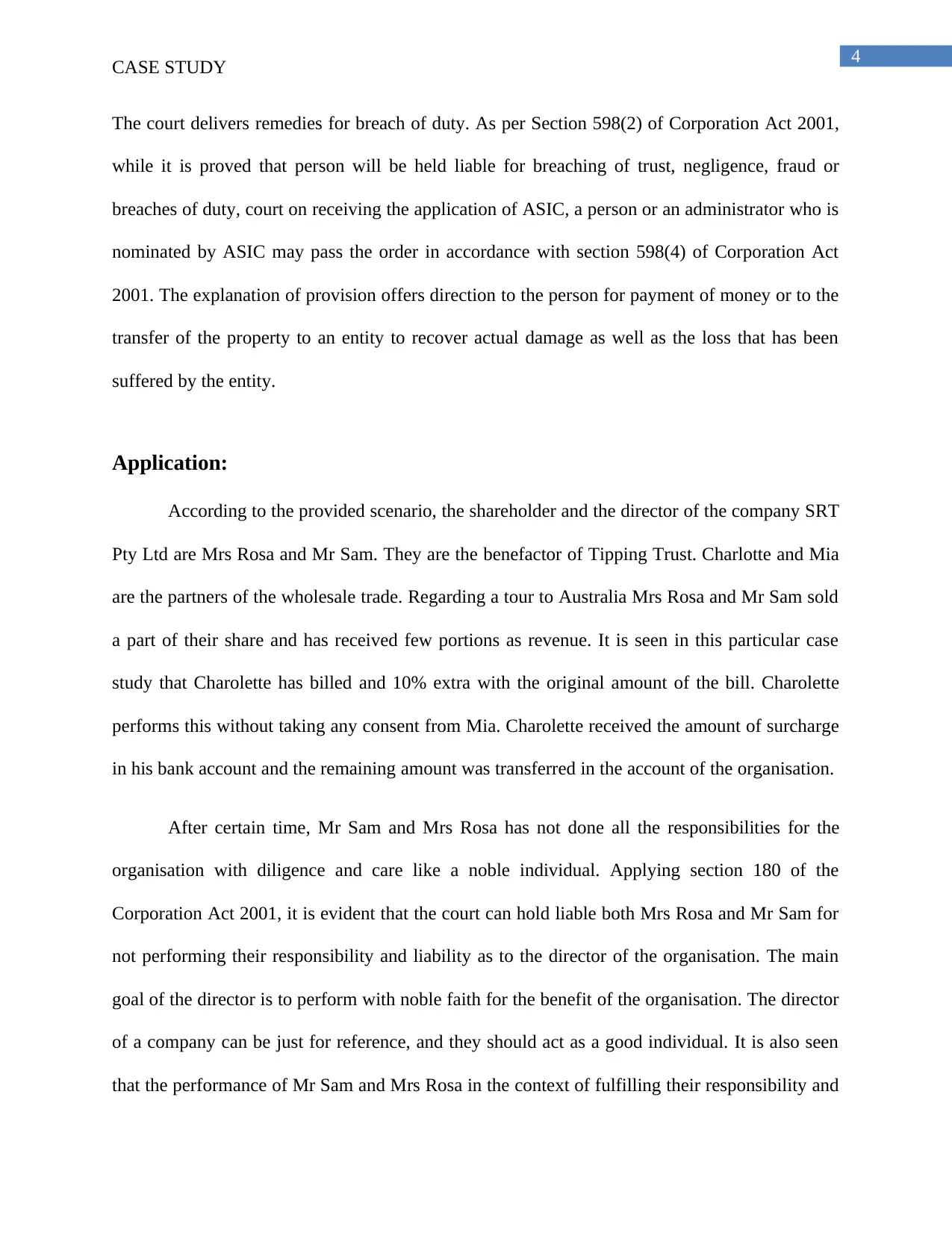
4
CASE STUDY
The court delivers remedies for breach of duty. As per Section 598(2) of Corporation Act 2001,
while it is proved that person will be held liable for breaching of trust, negligence, fraud or
breaches of duty, court on receiving the application of ASIC, a person or an administrator who is
nominated by ASIC may pass the order in accordance with section 598(4) of Corporation Act
2001. The explanation of provision offers direction to the person for payment of money or to the
transfer of the property to an entity to recover actual damage as well as the loss that has been
suffered by the entity.
Application:
According to the provided scenario, the shareholder and the director of the company SRT
Pty Ltd are Mrs Rosa and Mr Sam. They are the benefactor of Tipping Trust. Charlotte and Mia
are the partners of the wholesale trade. Regarding a tour to Australia Mrs Rosa and Mr Sam sold
a part of their share and has received few portions as revenue. It is seen in this particular case
study that Charolette has billed and 10% extra with the original amount of the bill. Charolette
performs this without taking any consent from Mia. Charolette received the amount of surcharge
in his bank account and the remaining amount was transferred in the account of the organisation.
After certain time, Mr Sam and Mrs Rosa has not done all the responsibilities for the
organisation with diligence and care like a noble individual. Applying section 180 of the
Corporation Act 2001, it is evident that the court can hold liable both Mrs Rosa and Mr Sam for
not performing their responsibility and liability as to the director of the organisation. The main
goal of the director is to perform with noble faith for the benefit of the organisation. The director
of a company can be just for reference, and they should act as a good individual. It is also seen
that the performance of Mr Sam and Mrs Rosa in the context of fulfilling their responsibility and
CASE STUDY
The court delivers remedies for breach of duty. As per Section 598(2) of Corporation Act 2001,
while it is proved that person will be held liable for breaching of trust, negligence, fraud or
breaches of duty, court on receiving the application of ASIC, a person or an administrator who is
nominated by ASIC may pass the order in accordance with section 598(4) of Corporation Act
2001. The explanation of provision offers direction to the person for payment of money or to the
transfer of the property to an entity to recover actual damage as well as the loss that has been
suffered by the entity.
Application:
According to the provided scenario, the shareholder and the director of the company SRT
Pty Ltd are Mrs Rosa and Mr Sam. They are the benefactor of Tipping Trust. Charlotte and Mia
are the partners of the wholesale trade. Regarding a tour to Australia Mrs Rosa and Mr Sam sold
a part of their share and has received few portions as revenue. It is seen in this particular case
study that Charolette has billed and 10% extra with the original amount of the bill. Charolette
performs this without taking any consent from Mia. Charolette received the amount of surcharge
in his bank account and the remaining amount was transferred in the account of the organisation.
After certain time, Mr Sam and Mrs Rosa has not done all the responsibilities for the
organisation with diligence and care like a noble individual. Applying section 180 of the
Corporation Act 2001, it is evident that the court can hold liable both Mrs Rosa and Mr Sam for
not performing their responsibility and liability as to the director of the organisation. The main
goal of the director is to perform with noble faith for the benefit of the organisation. The director
of a company can be just for reference, and they should act as a good individual. It is also seen
that the performance of Mr Sam and Mrs Rosa in the context of fulfilling their responsibility and
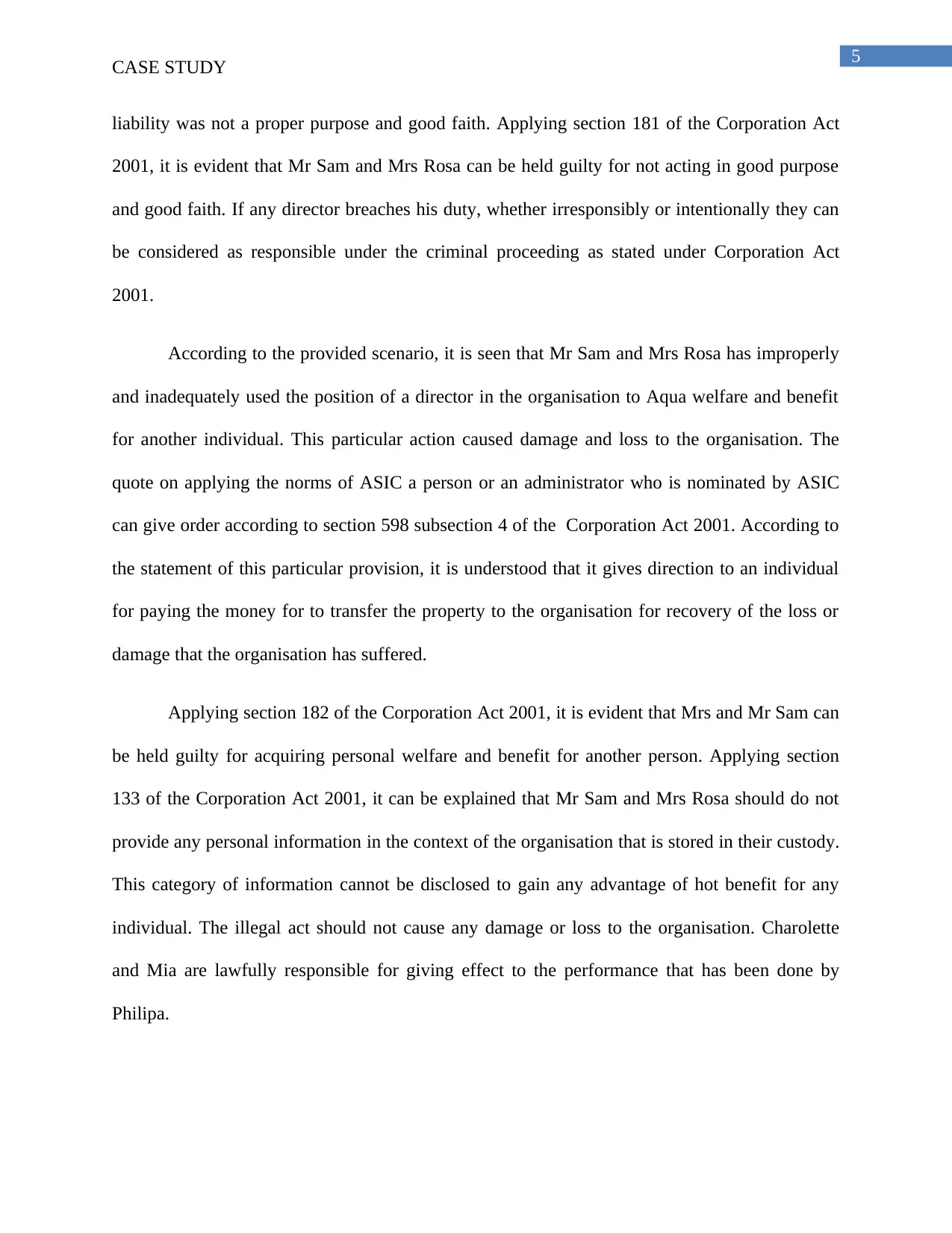
5
CASE STUDY
liability was not a proper purpose and good faith. Applying section 181 of the Corporation Act
2001, it is evident that Mr Sam and Mrs Rosa can be held guilty for not acting in good purpose
and good faith. If any director breaches his duty, whether irresponsibly or intentionally they can
be considered as responsible under the criminal proceeding as stated under Corporation Act
2001.
According to the provided scenario, it is seen that Mr Sam and Mrs Rosa has improperly
and inadequately used the position of a director in the organisation to Aqua welfare and benefit
for another individual. This particular action caused damage and loss to the organisation. The
quote on applying the norms of ASIC a person or an administrator who is nominated by ASIC
can give order according to section 598 subsection 4 of the Corporation Act 2001. According to
the statement of this particular provision, it is understood that it gives direction to an individual
for paying the money for to transfer the property to the organisation for recovery of the loss or
damage that the organisation has suffered.
Applying section 182 of the Corporation Act 2001, it is evident that Mrs and Mr Sam can
be held guilty for acquiring personal welfare and benefit for another person. Applying section
133 of the Corporation Act 2001, it can be explained that Mr Sam and Mrs Rosa should do not
provide any personal information in the context of the organisation that is stored in their custody.
This category of information cannot be disclosed to gain any advantage of hot benefit for any
individual. The illegal act should not cause any damage or loss to the organisation. Charolette
and Mia are lawfully responsible for giving effect to the performance that has been done by
Philipa.
CASE STUDY
liability was not a proper purpose and good faith. Applying section 181 of the Corporation Act
2001, it is evident that Mr Sam and Mrs Rosa can be held guilty for not acting in good purpose
and good faith. If any director breaches his duty, whether irresponsibly or intentionally they can
be considered as responsible under the criminal proceeding as stated under Corporation Act
2001.
According to the provided scenario, it is seen that Mr Sam and Mrs Rosa has improperly
and inadequately used the position of a director in the organisation to Aqua welfare and benefit
for another individual. This particular action caused damage and loss to the organisation. The
quote on applying the norms of ASIC a person or an administrator who is nominated by ASIC
can give order according to section 598 subsection 4 of the Corporation Act 2001. According to
the statement of this particular provision, it is understood that it gives direction to an individual
for paying the money for to transfer the property to the organisation for recovery of the loss or
damage that the organisation has suffered.
Applying section 182 of the Corporation Act 2001, it is evident that Mrs and Mr Sam can
be held guilty for acquiring personal welfare and benefit for another person. Applying section
133 of the Corporation Act 2001, it can be explained that Mr Sam and Mrs Rosa should do not
provide any personal information in the context of the organisation that is stored in their custody.
This category of information cannot be disclosed to gain any advantage of hot benefit for any
individual. The illegal act should not cause any damage or loss to the organisation. Charolette
and Mia are lawfully responsible for giving effect to the performance that has been done by
Philipa.
⊘ This is a preview!⊘
Do you want full access?
Subscribe today to unlock all pages.

Trusted by 1+ million students worldwide
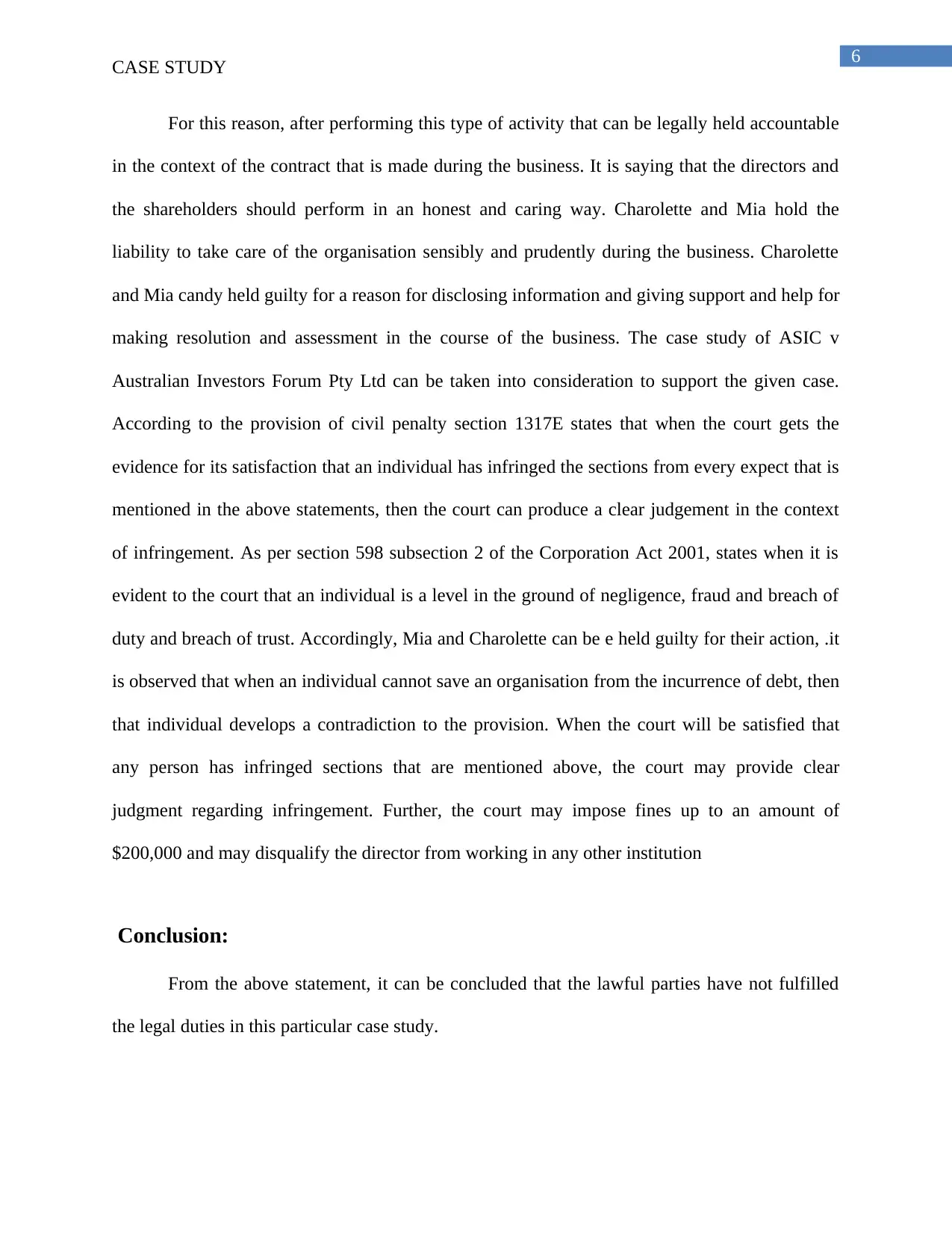
6
CASE STUDY
For this reason, after performing this type of activity that can be legally held accountable
in the context of the contract that is made during the business. It is saying that the directors and
the shareholders should perform in an honest and caring way. Charolette and Mia hold the
liability to take care of the organisation sensibly and prudently during the business. Charolette
and Mia candy held guilty for a reason for disclosing information and giving support and help for
making resolution and assessment in the course of the business. The case study of ASIC v
Australian Investors Forum Pty Ltd can be taken into consideration to support the given case.
According to the provision of civil penalty section 1317E states that when the court gets the
evidence for its satisfaction that an individual has infringed the sections from every expect that is
mentioned in the above statements, then the court can produce a clear judgement in the context
of infringement. As per section 598 subsection 2 of the Corporation Act 2001, states when it is
evident to the court that an individual is a level in the ground of negligence, fraud and breach of
duty and breach of trust. Accordingly, Mia and Charolette can be e held guilty for their action, .it
is observed that when an individual cannot save an organisation from the incurrence of debt, then
that individual develops a contradiction to the provision. When the court will be satisfied that
any person has infringed sections that are mentioned above, the court may provide clear
judgment regarding infringement. Further, the court may impose fines up to an amount of
$200,000 and may disqualify the director from working in any other institution
Conclusion:
From the above statement, it can be concluded that the lawful parties have not fulfilled
the legal duties in this particular case study.
CASE STUDY
For this reason, after performing this type of activity that can be legally held accountable
in the context of the contract that is made during the business. It is saying that the directors and
the shareholders should perform in an honest and caring way. Charolette and Mia hold the
liability to take care of the organisation sensibly and prudently during the business. Charolette
and Mia candy held guilty for a reason for disclosing information and giving support and help for
making resolution and assessment in the course of the business. The case study of ASIC v
Australian Investors Forum Pty Ltd can be taken into consideration to support the given case.
According to the provision of civil penalty section 1317E states that when the court gets the
evidence for its satisfaction that an individual has infringed the sections from every expect that is
mentioned in the above statements, then the court can produce a clear judgement in the context
of infringement. As per section 598 subsection 2 of the Corporation Act 2001, states when it is
evident to the court that an individual is a level in the ground of negligence, fraud and breach of
duty and breach of trust. Accordingly, Mia and Charolette can be e held guilty for their action, .it
is observed that when an individual cannot save an organisation from the incurrence of debt, then
that individual develops a contradiction to the provision. When the court will be satisfied that
any person has infringed sections that are mentioned above, the court may provide clear
judgment regarding infringement. Further, the court may impose fines up to an amount of
$200,000 and may disqualify the director from working in any other institution
Conclusion:
From the above statement, it can be concluded that the lawful parties have not fulfilled
the legal duties in this particular case study.
Paraphrase This Document
Need a fresh take? Get an instant paraphrase of this document with our AI Paraphraser
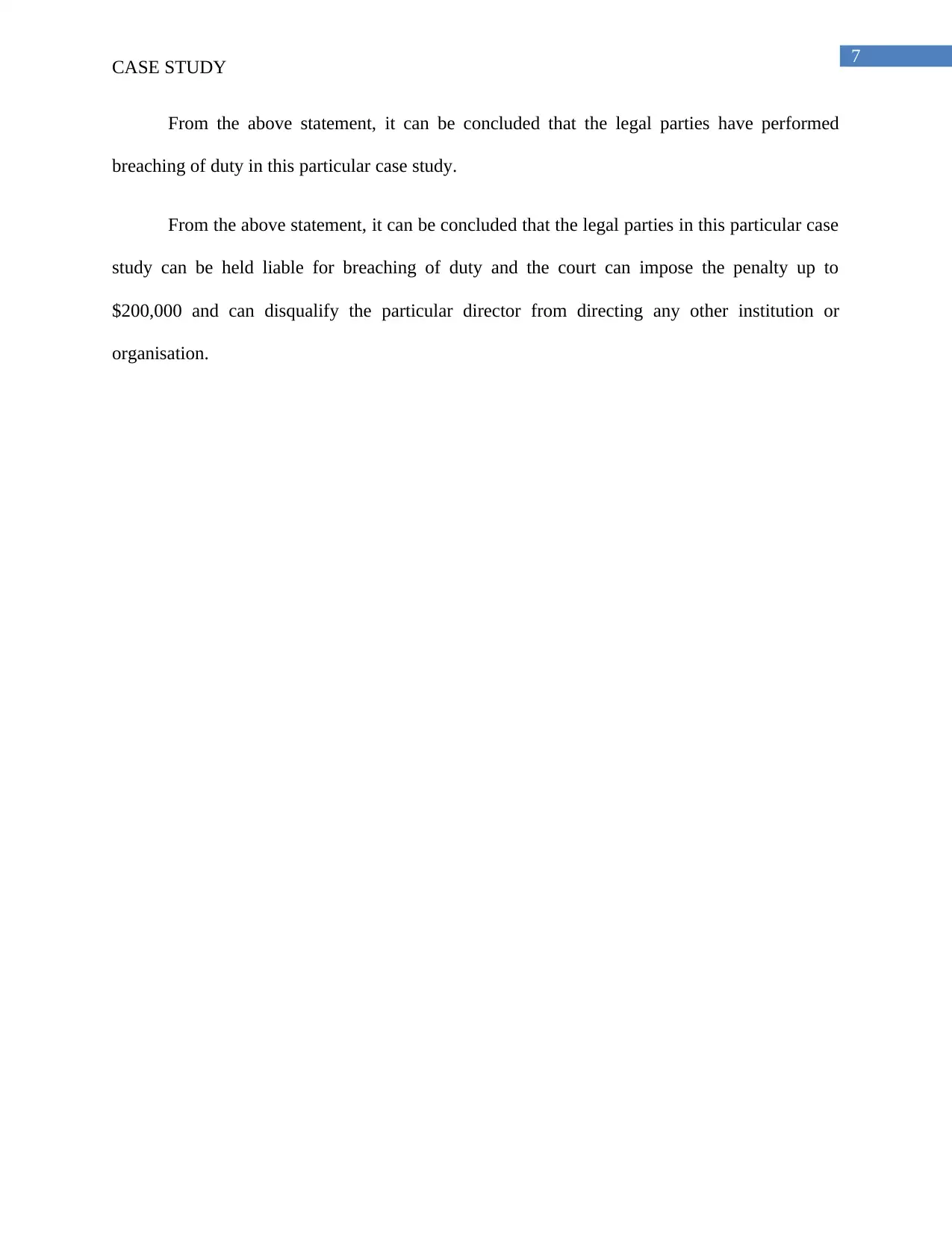
7
CASE STUDY
From the above statement, it can be concluded that the legal parties have performed
breaching of duty in this particular case study.
From the above statement, it can be concluded that the legal parties in this particular case
study can be held liable for breaching of duty and the court can impose the penalty up to
$200,000 and can disqualify the particular director from directing any other institution or
organisation.
CASE STUDY
From the above statement, it can be concluded that the legal parties have performed
breaching of duty in this particular case study.
From the above statement, it can be concluded that the legal parties in this particular case
study can be held liable for breaching of duty and the court can impose the penalty up to
$200,000 and can disqualify the particular director from directing any other institution or
organisation.
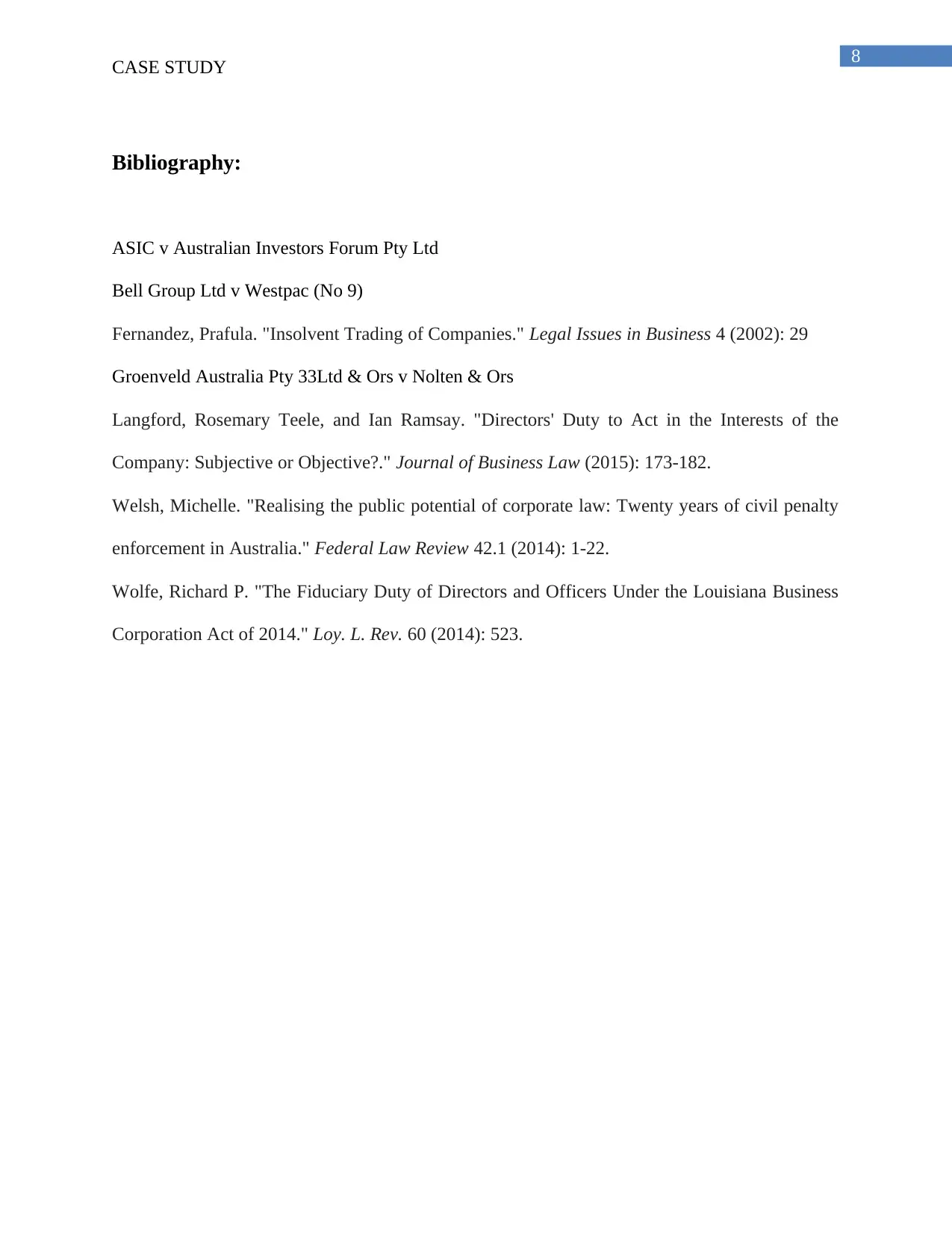
8
CASE STUDY
Bibliography:
ASIC v Australian Investors Forum Pty Ltd
Bell Group Ltd v Westpac (No 9)
Fernandez, Prafula. "Insolvent Trading of Companies." Legal Issues in Business 4 (2002): 29
Groenveld Australia Pty 33Ltd & Ors v Nolten & Ors
Langford, Rosemary Teele, and Ian Ramsay. "Directors' Duty to Act in the Interests of the
Company: Subjective or Objective?." Journal of Business Law (2015): 173-182.
Welsh, Michelle. "Realising the public potential of corporate law: Twenty years of civil penalty
enforcement in Australia." Federal Law Review 42.1 (2014): 1-22.
Wolfe, Richard P. "The Fiduciary Duty of Directors and Officers Under the Louisiana Business
Corporation Act of 2014." Loy. L. Rev. 60 (2014): 523.
CASE STUDY
Bibliography:
ASIC v Australian Investors Forum Pty Ltd
Bell Group Ltd v Westpac (No 9)
Fernandez, Prafula. "Insolvent Trading of Companies." Legal Issues in Business 4 (2002): 29
Groenveld Australia Pty 33Ltd & Ors v Nolten & Ors
Langford, Rosemary Teele, and Ian Ramsay. "Directors' Duty to Act in the Interests of the
Company: Subjective or Objective?." Journal of Business Law (2015): 173-182.
Welsh, Michelle. "Realising the public potential of corporate law: Twenty years of civil penalty
enforcement in Australia." Federal Law Review 42.1 (2014): 1-22.
Wolfe, Richard P. "The Fiduciary Duty of Directors and Officers Under the Louisiana Business
Corporation Act of 2014." Loy. L. Rev. 60 (2014): 523.
⊘ This is a preview!⊘
Do you want full access?
Subscribe today to unlock all pages.

Trusted by 1+ million students worldwide
1 out of 9
Related Documents
Your All-in-One AI-Powered Toolkit for Academic Success.
+13062052269
info@desklib.com
Available 24*7 on WhatsApp / Email
![[object Object]](/_next/static/media/star-bottom.7253800d.svg)
Unlock your academic potential
Copyright © 2020–2026 A2Z Services. All Rights Reserved. Developed and managed by ZUCOL.





